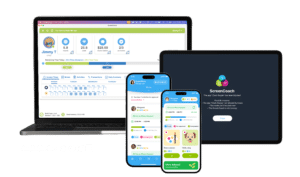
If you’re a parent who is addicted to your phone you could be affecting your relationship with your kids and additionally teaching them bad habits.
“Help! I’m addicted to my phone and it’s damaging my relationship with my kids.”
Here at ScreenCoach, we are developing a product to help kids manage their screen time, but we often hear people ask, “Does it work with adults too?” The answer is yes, absolutely!
So many of us are obsessed with our phones! For me personally, I have most notifications on my phone turned off. However, the temptation to check my phone is endless… What’s the weather going to be like tomorrow? Do I have any meetings this afternoon? What’s on TV tonight? Did someone just message me? Let me take a photo of that! We need bananas – better add that to the shopping list app… it goes on and on…
Not only does it impact our ability to be present with our kids (and others), many parents are also concerned about their role modelling. After all, kids do as we do, not as we say.
Screens have literally taken over our lives and impacted our ability to focus on anything for more than a few minutes. Johann Hari discusses this in his book “Stolen Focus – Why You Can’t Pay Attention”. He says, “Your attention didn’t collapse. It was stolen.”
So how do we get it back?
In addition to installing ScreenCoach when it becomes available, here are a few tips to help you to put your phone away and be more connected with your kids.
The first thing is to acknowledge that the urge to pick up your phone is a habit that will probably take a bit of time to break. Our brains have become accustomed to constantly shifting from one task to another, and it is uncomfortable to stay with one thing! But with persistence and practice you can do it.
Have some rules that you stick to each day. For example, no phone at the dinner table or while driving, while spending 1-1 time with your child reading to them or putting them to bed. If you feel comfortable doing so, ask your child to remind you if you forget or stray from the rules.
Next, consider turning off all notifications and alerts on your phone except the ones that are necessary. There’s nothing more distracting than having your phone pinging and dinging and lighting up constantly, it’s very hard to ignore. It would be akin to a chocolate cake calling out, “eat me, eat me”! If you have anyone in your life who expects you to be on call for them 24/7, let them know that when you’re with your kids you will be putting your phone away and will be in touch with them when you pick it up again. Set firm boundaries for work and make it clear that you will not be checking emails and messages outside work hours unless there are exceptional circumstances. Another suggestion is to delete the social media apps off your phone to avoid the temptation of constantly checking them. Set aside a half hour or an hour at night when the kids are in bed to check your socials on your computer. If you’ve done these things and are still tempted to pick up your phone, during certain times of the day, put your phone away so it’s out of sight – in another room or a drawer. To use the chocolate cake analogy again, keeping your phone handy and trying not to look at it is like having a delicious chocolate cake on your kitchen counter and trying not to eat it – it’s a constant temptation that makes things more difficult!
Remember that it will take some time to retrain your brain so you might like to start slow with decoupling from your phone – perhaps half an hour or an hour at first and then and build it up. Good luck!
A final note: If you find parenting difficult and triggering, and recognise that you are using your phone as a coping mechanism, you are not alone! There is nothing wrong with you. The adage, “it takes a village to raise a child” is true, and yet so many parents, particularly mothers, are doing it alone – often while working as well! – and it can be really tough. Seek help and support where possible, from friends and family or professional help if necessary. Your kids will benefit from it – and you will also be thankful when your kids grow up that they know how to interact with the real world outside of a device!
Steph
Stephanie Kakris has a Masters in Psychology and is a published parenting author. She is the co-founder of ScreenCoach, a combined hardware and software platform where kids are allocated a set amount of screen time, and after their time is up, they need to go and complete activities such as exercise, chores or non-screen play to earn more time before they can resume. Find out more at www.myscreencoach.com
By Stephanie Kakris has a Masters in Psychology and is a published parenting author. She is the co-founder of ScreenCoach, a combined hardware and software platform where kids are allocated a set amount of screen time, and after their time is up, they need to go and complete activities such as exercise, chores or non-screen play to earn more time before they can resume. Find out more at www.myscreencoach.com
Sign up for ScreenCoach for $1 | Pricing Plans | Features Overview







